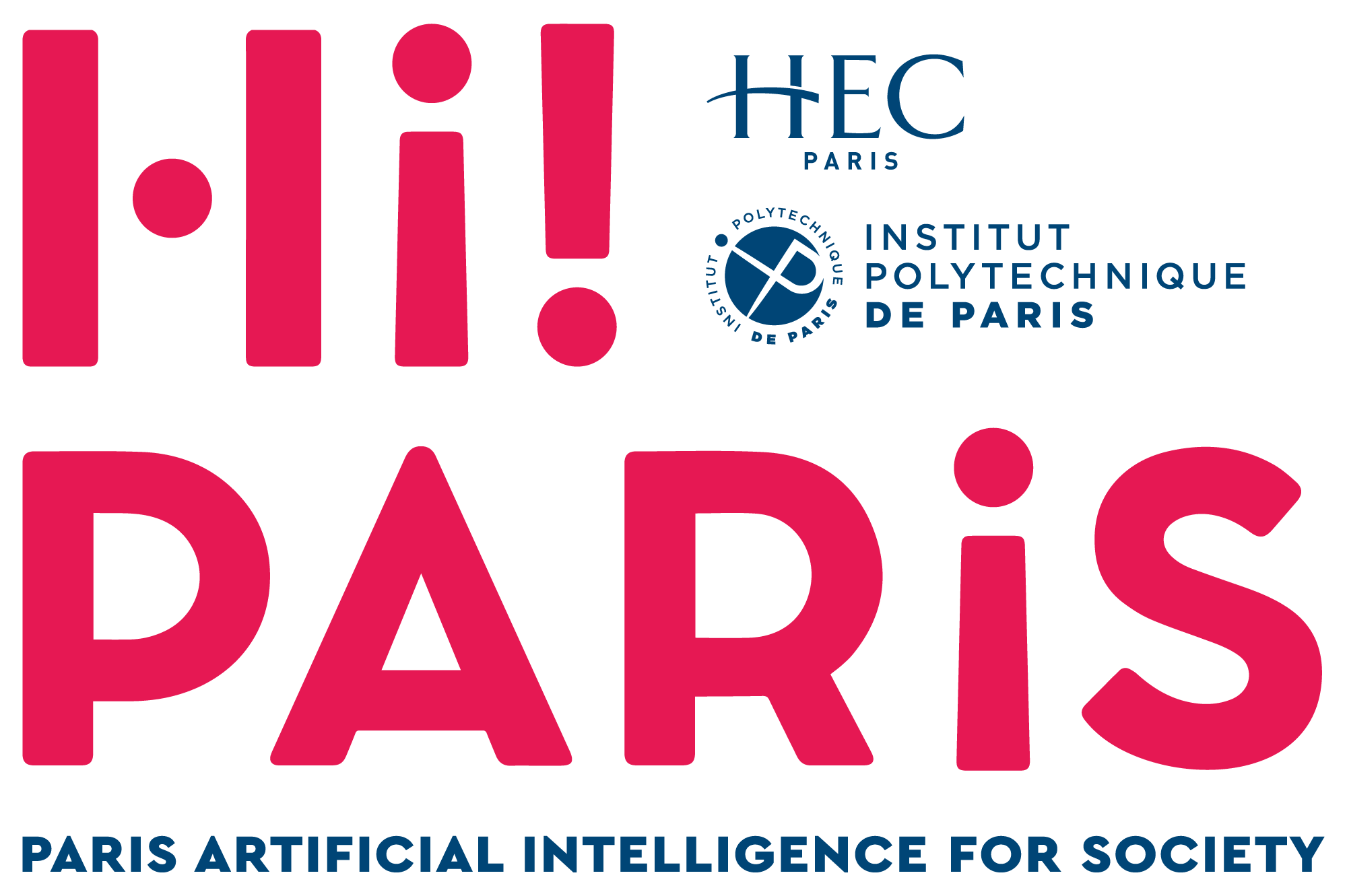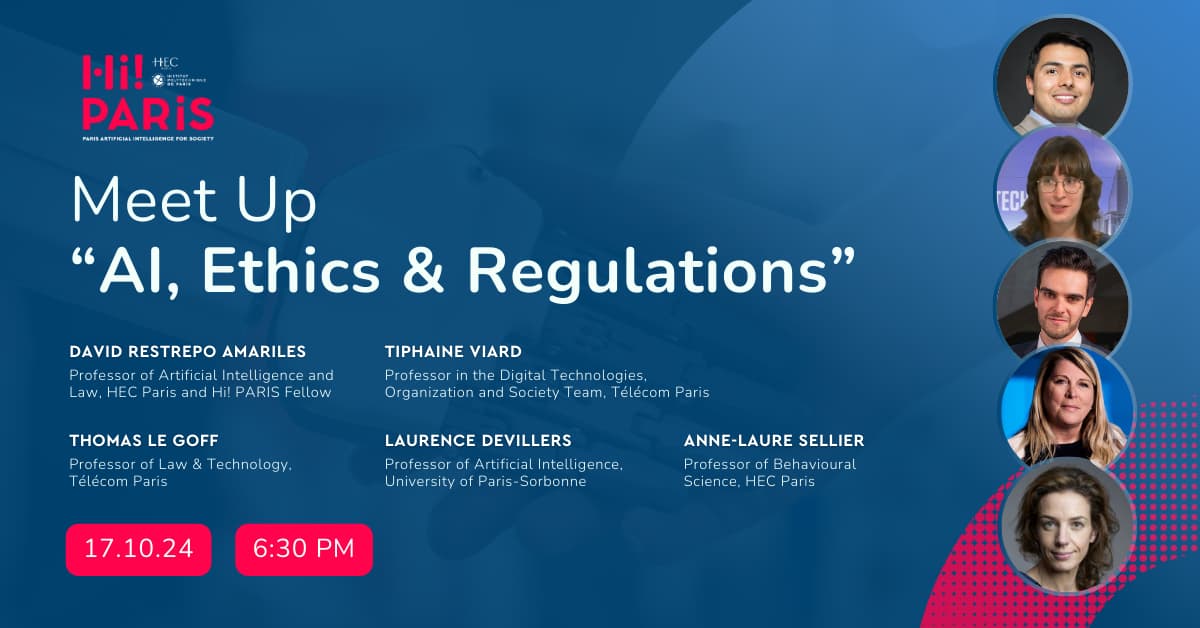Hi! PARIS Meet Up! on AI, Ethics & Regulations
The Hi! PARIS Meet Up! event will be dedicated to “AI, ETHICS & REGULATIONS”. The event will be hosted at Schneider Electric.
A great opportunity to connect to the latest research and to network with business leaders and academics.
Come and join us!
Meet Up! On AI, Ethics & Regulations
Thursday 17 October, 6:30-9:00 PM (Paris Time)
At Schneider Electric (35 rue Joseph Monier, 92500 Rueil-Malmaison, France).
This event continues the conversation from our first Meet Up on AI and Ethics, with a specific focus this time on the regulatory aspects surrounding AI. It offers a unique opportunity to explore the latest research on AI, ethics, and regulations, and to engage with a diverse group of academics, business leaders, and industry professionals.
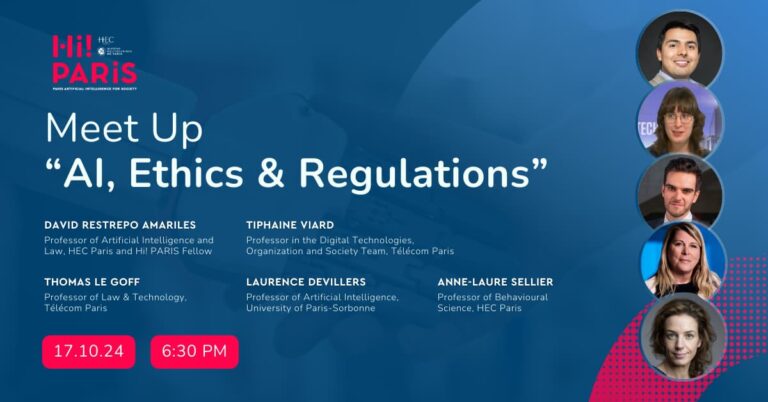
If you’d like to attend the event, reach out to contact@hi-paris.fr for your personal invite!
Hi! PARIS Meet Up on AI, Ethics and Regulations
We will gather around the theme “AI, Ethics and Regulations“.
In a world where AI is rapidly transforming industries and societies, it is essential to grasp the complex ethical implications and regulatory challenges that accompany these technologies. AI, Ethics, and Regulations is a multidisciplinary field that explores critical issues such as the environmental impact of AI systems, the sociotechnical dynamics they create, and the broader implications for privacy, fairness, transparency, and accountability.
As AI increasingly influences decision-making processes and permeates various aspects of our lives, it is crucial to approach these developments with a responsible and nuanced perspective. By bringing together researchers, industry professionals, policymakers, and the broader community, this event seeks to ensure that AI advancements are not only aligned with societal values but also address environmental sustainability, promote equity, and prioritize the well-being of individuals and communities.
Join us for presentations and a panel discussion of Hi! PARIS researchers in the domain and let’s discuss of AI, Ethics and Regulations!
Take the opportunity to meet young researchers from Hi! PARIS network who will present their PhD thesis through posters.
Program
Welcome to the venue from 6:30 PM.
The event will officially start at 6:30 PM with a poster session: our young researchers will present their doctoral thesis in a very accessible manner.
From 7:15 PM, we will gather for a panel discussion with Hi! PARIS researchers experts in this domain and a Q&A session with the audience.
- Tiphaine Viard (Télécom Paris – IP Paris)
“Hype or reality? Mapping artificial intelligence “
Abstract: Artificial Intelligence forms a sociotechnical construct, combining technical components like machine learning with social aspects. AI systems, which operate on physical servers, come with significant environmental costs and depend on both visible and invisible human labor. Since May 2024, AI has entered regulated territory in the EU with the adoption of the AI Act, and it is widely used in high-risk societal settings, often leading to new and unexpected uses.
In a context where the attention of citizens and policymakers is limited, it’s essential to clearly understand the actors and institutions involved and to distinguish between speculation and real challenges. This talk will explore recent findings in the sociology of AI, reframing AI within its broader socio-environmental context, and discuss efforts to map AI’s social landscape.
- Thomas Le Goff (Télécom Paris – IP Paris)
“The environmental unsustainability of AI: a call for regulation“
Abstract: To be developed and function effectively, AI systems require substantial natural resources, including energy (due to electricity consumption by data centers), water (for cooling systems), and other raw materials (for building the hardware). While AI can significantly contribute to climate change mitigation and the energy transition, it is now widely recognized that this technology has a problematic environmental footprint. However, this risk is not directly addressed by current or proposed regulations, including the EU AI Act and the Council of Europe’s Treaty on AI. Our talk will provide an overview of the paradoxical relationship between AI and environmental sustainability and discuss potential solutions that environmental regulations could offer.
- David Restrepo Amariles (HEC Paris)
“Three Challenges AI Corporate Policies Should address for Trustworthy AI”
Abstract: In this talk, he will explore the value of corporate policies in addressing some key behavioural and regulatory challenges necessary to ensure Trustworthy AI. Specifically, he will focus on three issues:
First, he will highlight the need to address the misalignment between individual incentives and corporate risks in the use of Generative AI (GenAI). While GenAI offers employees powerful tools to boost productivity, it creates a situation where individuals may not disclose its usage, keeping the productivity gains to themselves, while organizations bear the associated risks of ungoverned GenAI use.
Second, he will discuss the need for organizations to rethink their incentive structures to tackle increasing agency problems generated by AI. Issues such as moral hazard and information asymmetry among team members can undermine proper collaboration, hindering both the assessment of risks and the realization of AI’s full potential.
Lastly, he will emphasize the need for clear guidelines as organizations face multi-dimensional evaluations of AI performance—balancing factors like accuracy, privacy, human rights, return on investment (ROI), and computational resources. The ability to make these trade-offs explicit is crucial for both effective AI governance and compliance.
“Ethical issues of AI and socio-affective Robots”
Abstract: She offers studies and reflections on the ethical issues of AI and socio-affective robots. Conversational agents and social robots using learning systems and affective computing will change the game around ethics. Long-term experimentation is needed to survey Human-Machine Co-evolution and to build ethics-by-design chatbots and robots. In the chair HUMAAINE (L. Devillers, CNRS), she aims to study Human-Machine Affective interactions and relationships, in order to audit and measure the potential influence of intelligent and affective systems on humans, and ultimately to work towards the conception of “ethical systems,” whether by design or not, and to propose evaluation measures.
To this end, her scientific work focuses on the detection of social emotions in human voice and on the study of audio and spoken language “nudges,” intended to induce changes in the behavior of the human interlocutor. This work should be complemented by experimental studies (long-term, human vs. machine influence, etc.) to evaluate ethical aspects and confidence in machines, as well as by demystification of these technologies among the general public, which naturally tends towards anthropomorphism. The importance of this subject also lies in the variety of its societal applications, ranging from care for the elderly and vulnerable people to education.
From 8:15-9:00 PM, we will have the opportunity to extend the discussion with a networking cocktail on the terrace of the venue.
Registration
Registration is free and mandatory.
The speakers
The panel of the round table is composed of experts within these fields from Hi! PARIS institutions. They will give short presentations, as well as participate to a general round table discussion around the topics of AI & Ethics!
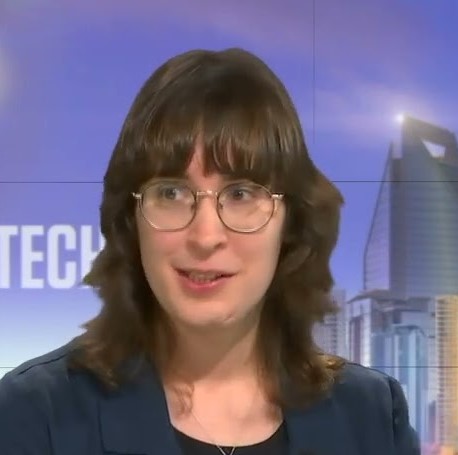
Tiphaine Viard – Télécom paris, IP Paris
Tiphaine Viard is an associate professor in the Digital Technologies, Organization, and Society team at Telecom Paris.
Her research focuses on the intersection of graphs and machine learning, particularly using graph-based methods to create more transparent and responsible models.
Previously, she was a postdoctoral researcher at LIPN, specializing in pattern mining on graphs, and at the Riken Center for Advanced Intelligence Project (AIP) in Tokyo, where she explored the interplay between graphs and machine learning. She also held a postdoctoral position at Cedric, CNAM, working on social recommender systems. Her PhD research at LIP6, supervised by Matthieu Latapy and Clémence Magnien, centered on event detection in interaction streams, aiming to develop a theoretical framework for anomaly detection in IP traffic.

Thomas Le Goff, Télécom Paris – IP Paris
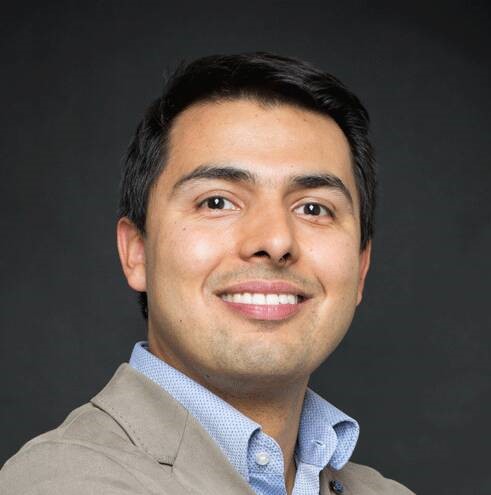
David Restrepo Amariles – HEC Paris
David Restrepo Amariles is Associate Professor of Artificial Intelligence and Law, as well as the Worldline Chair on the Future of Money at HEC Paris. He serves as the Director of the Centre on the Future of Money and Digital Assets and is a Fellow at the Hi! PARIS Center on Data Analytics and Artificial Intelligence, where he leads the Smart Law Hub. He is a member of the Collegium — Royal Academy of Sciences, Letters, and Fine Arts of Belgium, where he contributes as a member of the Class Technology and Society. David is a prominent public speaker and a sought-after advisor, offering guidance to firms on digital transformation and co-founding several tech start-ups. He extends his expertise globally, advising governments on legal reform in the realms of data and technology.

Laurence Devillers, Sorbonne Université
Laurence Devillers is a Full Professor of Artificial Intelligence (AI) at Sorbonne University and heads the research team on “Affective and social dimensions in Spoken interactions with (ro)bots: technological and ethical issues” at CNRS-LISN. Since 2020, she also leads the interdisciplinary Chair (including economists, linguists and computer scientists) on AI and digital nudge HUMAAINE: HUman-MAchine Affective INteraction & Ethics at CNRS. Her topics of research are Human-Machine co-evolution: from the modeling of emotions and human-robot dialogue to the ethical impacts for society and the risks and benefits of AI. She was a member of the National Comity Pilot on Ethics of Numeric (CNPEN)(2019-2024) and responsible of the JTC21/CEN_CENELEC WG4 (2022-2023) on Foundational and Societal Impact of AI (that include AI-enhanced Nudging, Trustworthiness AI and “Green” AI). She is now president of the Foundation Blaise Pascal on cultural mediation on Mathematics and Computer Science. She wrote large-audience books : ‘Les robots émotionnels’ (Ed. L’Obs., 2020), ´Des Robots et des Hommes: mythes, fantasmes et réalité’ (Ed. Plon, 2017) and recently a piece of theater with two other reseachers : “Qui a hacké Garoutzia ?” (2024).
